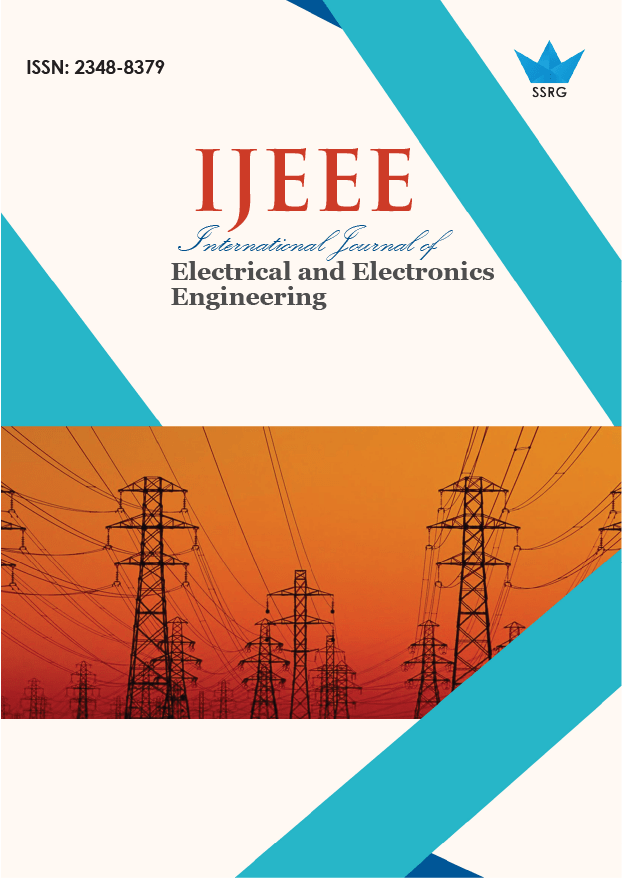An Effective Trajectory Tracking Control Method for Delta Robot Based on Backstepping Sliding Mode Control Techniques

| International Journal of Electrical and Electronics Engineering |
| © 2024 by SSRG - IJEEE Journal |
| Volume 11 Issue 4 |
| Year of Publication : 2024 |
| Authors : Hung Pham Van, Xuan Minh Dinh, Minh Pham Van, Nam Pham Van, Hai Le Xuan, Nam Khanh Nguyen |
How to Cite?
Hung Pham Van, Xuan Minh Dinh, Minh Pham Van, Nam Pham Van, Hai Le Xuan, Nam Khanh Nguyen, "An Effective Trajectory Tracking Control Method for Delta Robot Based on Backstepping Sliding Mode Control Techniques," SSRG International Journal of Electrical and Electronics Engineering, vol. 11, no. 4, pp. 55-63, 2024. Crossref, https://doi.org/10.14445/23488379/IJEEE-V11I4P107
Abstract:
In this paper, we propose the application of the backstepping sliding mode control method for the Delta robot, aiming to achieve desired motion trajectories in a short time and maintain system stability, even in the presence of unknown external disturbances affecting joint torques. The stability of the system is rigorously demonstrated based on the Lyapunov stability theory. The performance of the controller is evaluated through numerical simulations using the Matlab&Simulink tool, with a figure-eight trajectory, and compared with two other control algorithms, including classical PD and Backstepping. The results show that the proposed controller exhibits excellent performance, allowing for precise control of the Delta robot’s motion along the desired trajectory with minimal error, short response time, and improved stability compared to both PD and backstepping controllers, especially when the system is subjected to unknown external disturbances.
Keywords:
Delta robot, Asymptotic stability, Backstepping sliding mode control, Tracking control.
References:
[1] Luis Angel Castañeda, Alberto Luviano-Juárez, and Isaac Chairez, “Robust Trajectory Tracking of a Delta Robot Through Adaptive Active Disturbance Rejection Control,” IEEE Transactions on Control Systems Technology, vol. 23, no. 4, pp. 1387-1398, 2015.
[CrossRef] [Google Scholar] [Publisher Link]
[2] Weirong Yang, Weidong Liu, and Wen Tang, “Impedance and Backstepping Controller of Delta Robot Trajectory Tracking,” 2022 41st Chinese Control Conference (CCC), Hefei, China, pp. 750-755, 2022.
[CrossRef] [Google Scholar] [Publisher Link]
[3] Tingting Su et al., “Robust Trajectory Tracking of Delta Parallel Robot Using Sliding Mode Control,” 2019 IEEE Symposium Series on Computational Intelligence (SSCI), Xiamen, China, pp. 508-512, 2019.
[CrossRef] [Google Scholar] [Publisher Link]
[4] Le Minh Thanh et al., “Delta Robot Control Using Single Neuron PID Algorithms Based on Recurrent Fuzzy Neural Network Identifiers,” International Journal of Mechanical Engineering and Robotics Research, vol. 9, no. 10, pp. 1411-1418, 2020.
[CrossRef] [Google Scholar] [Publisher Link]
[5] Le Minh Thanh et al., “Evaluating the Quality of Intelligent Controllers for 3-DOF Delta Robot Control,” International Journal of Mechanical Engineering and Robotics Research, vol. 10, no. 10, pp. 542-552, 2021.
[CrossRef] [Google Scholar] [Publisher Link]
[6] Nguyen Van Khan et al., “A Comparison Study of Some Control Methods for Delta Spatial Parallel Robot,” Journal of Computer Science and Cybernetics, vol. 31, no. 1, pp. 71-81, 2015.
[CrossRef] [Google Scholar] [Publisher Link]
[7] O. Aguilar-Mejia et al., “Adaptive Control of 3-DOF Delta Parallel Robot,” 2019 IEEE International Autumn Meeting on Power, Electronics and Computing (ROPEC), Ixtapa, Mexico, pp. 1-6, 2019.
[CrossRef] [Google Scholar] [Publisher Link]
[8] Thanh-Lam Bui, Thanh-Hung Nguyen, and Xuan-Thuan Nguyen, “A Controller for Delta Parallel Robot Based on Hedge Algebras Method,” Journal of Robotics, vol. 2023, pp. 1-20, 2023.
[CrossRef] [Google Scholar] [Publisher Link]
[9] Chandan Choubey, and Jyoti Ohri, “GWO-Based Tuning of LQR-PID Controller for a 3-DOF Parallel Manipulator,” IETE Journal of Research, vol. 69, no. 7, pp. 4378-4393, 2021.
[CrossRef] [Google Scholar] [Publisher Link]
[10] João Cavalcanti Santos, Marc Gouttefarde, and Ahmed Chemori, “A Nonlinear Model Predictive Control for the Position Tracking of Cable-Driven Parallel Robots,” IEEE Transactions on Robotics, vol. 38, no. 4, pp. 2597-2616, 2022.
[CrossRef] [Google Scholar] [Publisher Link]
[11] Tobias Gold, Andreas Völz, and Knut Graichen, “Model Predictive Interaction Control for Industrial Robots,” IFAC-PapersOnLine, vol. 53, no. 2, pp. 9891-9898, 2020.
[CrossRef] [Google Scholar] [Publisher Link]
[12] Yazhou Hu et al., “Reinforcement Learning Tracking Control for Robotic Manipulator with Kernel-Based Dynamic Model,” IEEE Transactions on Neural Networks and Learning Systems, vol. 31, no. 9, pp. 3570-3578, 2020.
[CrossRef] [Google Scholar] [Publisher Link]
[13] Xi Chen, and Jan Guhl, “Industrial Robot Control with Object Recognition Based on Deep Learning,” Procedia CIRP, vol. 76, pp. 149- 154, 2018.
[CrossRef] [Google Scholar] [Publisher Link]
[14] Rongrong Liu et al., “Deep Reinforcement Learning for the Control of Robotic Manipulation: A Focussed Mini-Review,” Robotics, vol. 10, no. 1, pp. 1-13, 2021.
[CrossRef] [Google Scholar] [Publisher Link]

 10.14445/23488379/IJEEE-V11I4P107
10.14445/23488379/IJEEE-V11I4P107